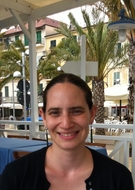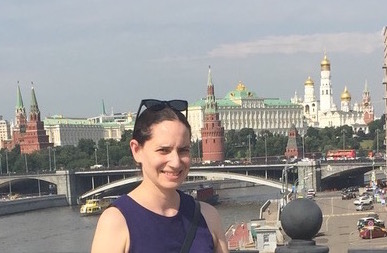Rachel Applebaum

Education:
Ph.D., University of Chicago
M.A., University of Toronto
B.A., McGill University
Rachel Applebaum is an Assistant Professor of Modern Russia and Eastern Europe in the Department of History at Tufts University.
When did you first develop an interest in Slavic, East European and Eurasian Studies?
My interest in Russia began in 7th grade, when we did a unit on Russian history. It was the year after the Soviet Union collapsed, but our curriculum was still obviously shaped by the Cold War (we were assigned to write an essay about which political system we most preferred: “communism, socialism, or capitalism”). What interested me the most was learning about the Romanovs—I became virtually obsessed with Tsar Nicholas II and his family. I began studying Russian when I was 14. In another hold-over from the Cold War era, my public high school in Cambridge, MA offered Russian. However, my parents initially wanted me to keep learning Spanish. They hired a Russian tutor so I could study the language after school. My tutor was Ingrid Kleespies, then a recent Harvard graduate, who is now a professor of Russian literature at the University of Florida and also an ASEEES member!
I only became interested in Soviet history in college, when I spent a semester in St. Petersburg. Imperial Russia felt very far away, but the Soviet past was everywhere, and I wanted to understand it better. My interest in Soviet history eventually led me to want to know more about the history of the Eastern Bloc. In 2004, while doing my MA at the University of Toronto, I spent a semester as an exchange student at Central European University in Budapest. That experience sparked my curiosity about the Soviet relationship with its socialist satellites, which led in turn to my new book, Empire of Friends.
What support have you received throughout your career (from ASEEES/other societies/federal support/etc.) that has allowed you to advance your scholarship?
I’ve been fortunate to receive a number of grants to support my scholarship over the years, including a Fulbright-Hays Doctoral Dissertation Research Award, a Mellon/ACLS Dissertation Completion Fellowship, a George Kennan Institute Short-Term Scholar Grant, a Short-Term Fellowship at the Jordan Center for the Advanced Study of Russia at NYU, and grants from Tufts University. I also received a First Book Subvention Award from ASEEES in 2018 to support the publication of Empire of Friends (Empire of Friends: Soviet Power and Socialist Internationalism in Cold War Czechoslovakia, Cornell University Press 2019). This summer I will be spending a month in Moscow conducting archival research thanks to a Franklin Research Award from the American Philosophical Society.
What is your current research/work project?
I’m currently working on a new book project about the development of Russian as a world language during the Cold War. The book examines the export and reception of Russian in the three "worlds" of the Soviet imagination: the socialist countries, the capitalist countries, and the "developing" countries. My aim is to use the story of the spread of the Russian language abroad as a lens to examine how the USSR's citizens, allies, and enemies responded to the country's transformation into a global cultural power.
What does your ASEEES membership mean to you? How has your involvement with ASEEES helped to further your career?
For me, my ASEEES membership is about community and broadening my intellectual horizons. The annual conventions provide a great opportunity to catch up with friends I’ve made at different stages in my academic career—graduate school, the archives, other conferences. In addition, as a scholar whose work covers the Soviet Union and communist Eastern Europe, I really value the opportunity to attend panels focusing on the USSR as well on the Eastern Bloc countries.
What do you believe is the most important impact ASEEES has on the field?
ASEEES provides a great opportunity for scholars focusing on different regions, time periods, and disciplines to engage with one another. I also think the advocacy ASEEES does on a range of issues, whether U.S. government funding for scholarship focusing on Russia/Eastern Europe, or supporting Central European University, is very important.
Besides your professional work, what other interests and/or hobbies do you enjoy?
My hobbies include bike riding, cooking, going to the movies, and traveling.
